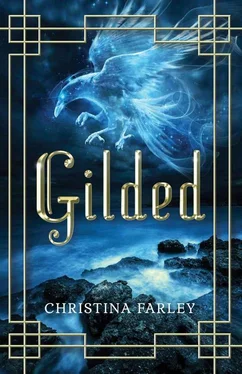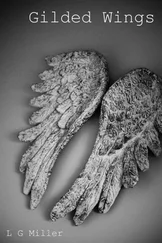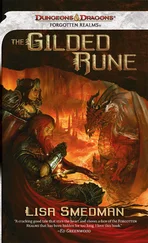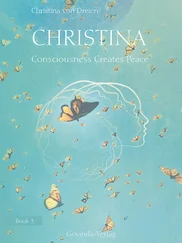“In ancient times there was a daughter of the spirit of the river.”
I’d rather discuss potential boarding school options. “I thought Dad didn’t want you telling me stories,” I say, trying to steer the conversation back on course.
“Her name was Princess Yuhwa,” he continues, ignoring my comment. “In fact, she was about your age. She had such beauty, anyone who laid eyes on her fell in love with her. One hot day, she and her sisters were bathing in a pond. This was the very day Haemosu, a demigod, decided to pay a visit to the people of the earth and set his mark on the land.”
Demigod? I press my chin to my tucked-in knees and stare out at the rounded island just beyond our beach.
“He saw her and fell instantly in love,” Grandfather says. “Haemosu decided he must have Princess Yuhwa as his wife. But she refused. He gave her a beautiful bracelet gilded of heavenly gold and promised he would change her mind. Four more times he returned, entreating her to come with him to his beautiful land. Yet still the princess refused. This infuriated him, and he decided to marry her against her will.”
“Why don’t princesses ever do something in all these old stories?” I interrupt. “Like try to escape or get someone to help them?”
“She did tell her father, the water god, Habaek. When he discovered that Haemosu did not follow the proper marriage ceremony, he fought with Haemosu. Habaek lost. Helpless, the princess was taken away in Haemosu’s chariot, Oryonggeo, driven by five dragons to the Spirit World.”
I dig the toe of my boot into the sand. “That’s a great story. But if you’re worried about me getting whisked away, you don’t need to. I can take care of myself.” Although a chariot driven by five dragons does sound pretty cool.
His eyebrows knit as he frowns. “I have not finished.”
“Oh. Right. Sorry.” It’s then that I notice the tide has pulled back about twenty feet, leaving behind a bank of mud. I sit up. When did that happen?
“What Haemosu underestimated was Princess Yuhwa. She secretly withdrew a golden pin from her hair, cut her way through the bottom of the chariot, and fell back to her people.”
I’d always thought princesses were more of the fainting type. Good for Yuhwa. “I guess Haemosu wasn’t too thrilled about that,” I say.
“He was furious,” Grandfather says, fingering the ring on his finger. “The legend says he searched everywhere for her, but she remained hidden in her father’s palace. Secretly, she bore Haemosu’s son, Chumong, who later became the founder of the Koguryo kingdom in ancient Korea.”
Is this some warped idea of happily ever after? “So it all worked out. Good for her.”
Grandfather rises, smoothing out the wrinkles in his tunic. “But it didn’t.”
I’m not sure if it’s from the tone of his voice or the oddness of the story, but a heaviness presses on me like a storm cloud.
“What the legend does not mention is that the princess fled to China, where Haemosu had no power.” Grandfather focuses on me. “Even today Haemosu still seeks her.”
Chills slither up my spine as I think about this twisted fairy tale. I nearly jump when one of the servants rushes up to us. “Sir,” he says in Korean. “Your brother’s family has arrived.”
“Well then.” Grandfather stands and pats me on the shoulder. “I must greet them. I had hoped for us to have more time together. Perhaps tomorrow?” When I don’t answer, he says, “Do you wish to join me? You have yet to meet the rest of the family.”
“Maybe later,” I say with a shrug. Meeting another set of strangers sounds even more painful than listening to Grandfather’s psycho stories.
“As you wish.” He starts off, but stops and glances over his shoulder. “Do not go to the outer island without me. It would not be wise.”
He turns and heads back to the house, his stride sure and quick, even with the wintry breeze whipping at his tunic.
I stare out at the island, wondering what Grandfather meant. A sound of rushing water catches my attention, and I notice how the water level is rapidly decreasing. A makeshift bridge of stepping stones from Grandfather’s beach to the tiny island not forty feet away appears. The stones must have been hidden under the water, and now that the tide has pulled back, their surfaces poke out of the mud, slick and shiny in the winter sun.
I slide off the rock and rub my hands together. Curiosity tugs at me like the tide, and I can’t stop myself. I cross the stepping-stone bridge, careful not to slip on its mud-slathered surface.
Once on the island, I follow an overgrown trail across a meadow, which leaves me at a series of volcanic-like boulders that spike up, jagged and taller than a two-story house. Looking around, I can’t figure out what’s so dangerous about this place that Grandfather had to warn me explicitly about it.
I start climbing the rocks for fun, trying to remember the moves I learned at summer camp two years ago in Montana. I’m halfway up a rock side when I spot a narrow passageway between two boulders that twists its way from the beach to the rocks. I drop to the ground.
The passageway is so narrow I have to shimmy sideways. Above, the sky looks like a zigzag streak of paint between the uneven rock walls. At the end rests a wooden door, typhoon weathered. Why in the world is there a door here? I wonder. I turn the handle, and, with a click, it opens.
Is this place Haraboji’s? Sure, he’s my grandfather, but what do I really know about him? I peek inside. It’s dark as pitch. On a stone ledge just inside the door sits a metal box from which I extract a lighter. I ignite the torch lying against the wall, and instantly the long, rock-walled corridor is illuminated.
This is absolutely the most fascinating place I’ve ever seen. I know I shouldn’t be here. I could head back to Haraboji’s house to meet the distant relatives and attempt smiles, all the while tortured with curiosity over what lies at the other end of this corridor.
Or I could explore.
I glance over my shoulder, licking the salt from my lips. I’ll just go to the end of the hallway, I promise myself. Grandfather will never know.
Musty air saturates the corridor as I follow the torch-lit path, trailing my hand over the smooth walls that must have been carved out by ancient waves. A sharp breeze howls through the tunnel and slams the door shut behind me. I jump and nearly trip over myself.
Now free of the wind, the passageway is damp and cold. The torchlight flickers ghostly shadows over the walls, and the air is silent. I shudder and eye the door, debating whether to go back or explore. Ultimately the lure of the unknown draws me deeper.
At the end of the corridor I discover a space about fifteen feet in diameter. I stare. It’s like some ancient tomb we’d study in school. But it isn’t a tomb. It’s something else entirely.
Sconces hang from each of the walls and, wanting to see the room clearer, I light them. Two of the walls show a mural of a princess riding in a chariot drawn by five golden dragons. Though the colors have faded to pale yellows and light blues, I know she must be Princess Yuhwa. I move closer, studying her. She looks just like me. Creepy .
I back away to check out the rest of the room. Along the far wall is a wooden shelf packed with scrolls and leather-bound books. Hundreds maybe.
I rub my sweaty hands down my jeans. Okay, so I’m definitely not supposed to be here. I should go. Dad’s probably wondering about me, too.
But my attention is pulled, almost by force, to the fourth wall, which is covered with bows, quivers, and arrows hanging on pegs. I eye the smooth wood of one horn bow, so old it should be in a museum. The image of the Blue Dragon, one of the four immortal guardians of Korea, is painted on it. The horn bow is unique to Korea, known for its ability to shoot arrows farther than any other bow. My fingers itch to take it off the wall, string it, and draw back on it to feel its pull.
Читать дальше












